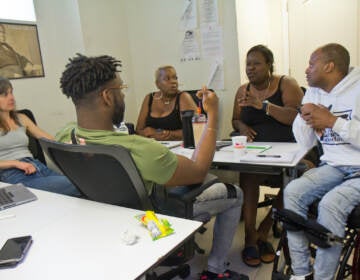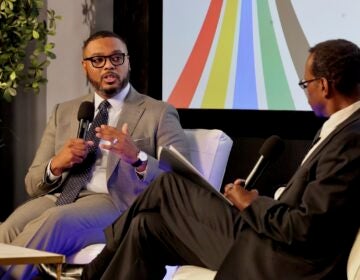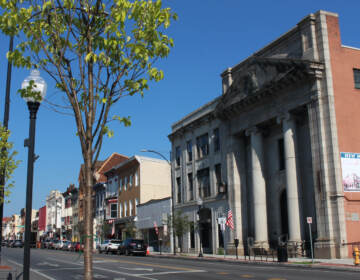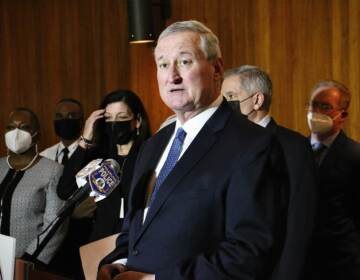Gun violence activists, city officials brainstorm a way forward on gun violence prevention
In the spirit of collaboration, gun violence activists met with city leaders and law enforcement Thursday to share ideas for confronting the crisis.
Listen 3:40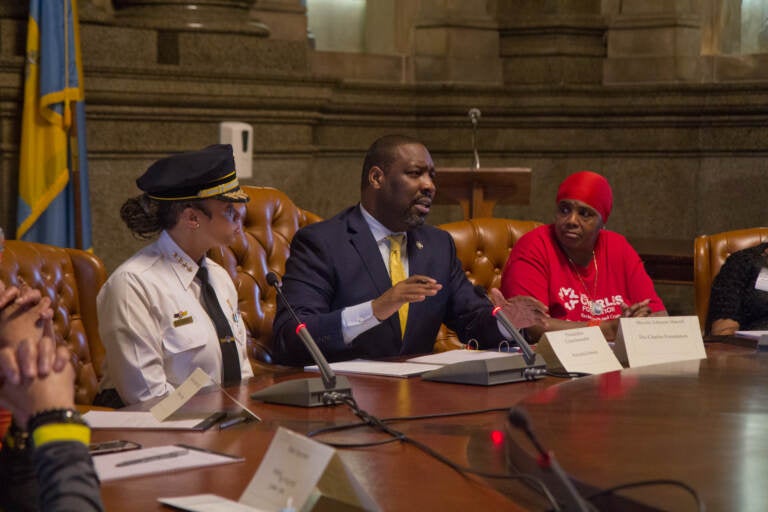
Philadelphia Police Commissioner Danielle Outlaw (left) briefly joined council member Kenyatta Johnson (center), other lawmakers and activists at a meeting to talk about solutions to gun violence in the city on June 9, 2022. (Kimberly Paynter/WHYY)
Nonprofit leaders, city officials and law enforcement representatives met for a gun violence roundtable Thursday in an effort to encourage collaboration between groups that advocates say often work in silos.
Councilmember Kenyatta Johnson organized the meeting, and said it was planned before a mass shooting erupted on South Street last Saturday, killing three and wounding 11. But the incident, perhaps because of its large casualty count and central location, has shaken the public’s sense of safety and drawn new attention to a gun violence crisis that’s been brewing in Philadelphia for years, exacerbated by the stress of the pandemic and an influx of weapons into the city.
Johnson’s staff said takeaways from the meeting will be shared with Mayor Jim Kenney’s administration, the District Attorney’s office and other agencies so they can work to implement solutions.
There have been 997 shootings in Philadelphia this year, 196 of them fatal according to June 9th data from the Office of the Controller. That’s more than one person killed by a firearm every day. Nearly half of victims are between ages 18 and 30, and more than three quarters are Black.
“I’m a firm believer that we didn’t get here overnight, and we’re not going to get out of this situation overnight,” Johnson said. “But as we go into the summer, I thought it would be appropriate to get the key leaders around the table.”
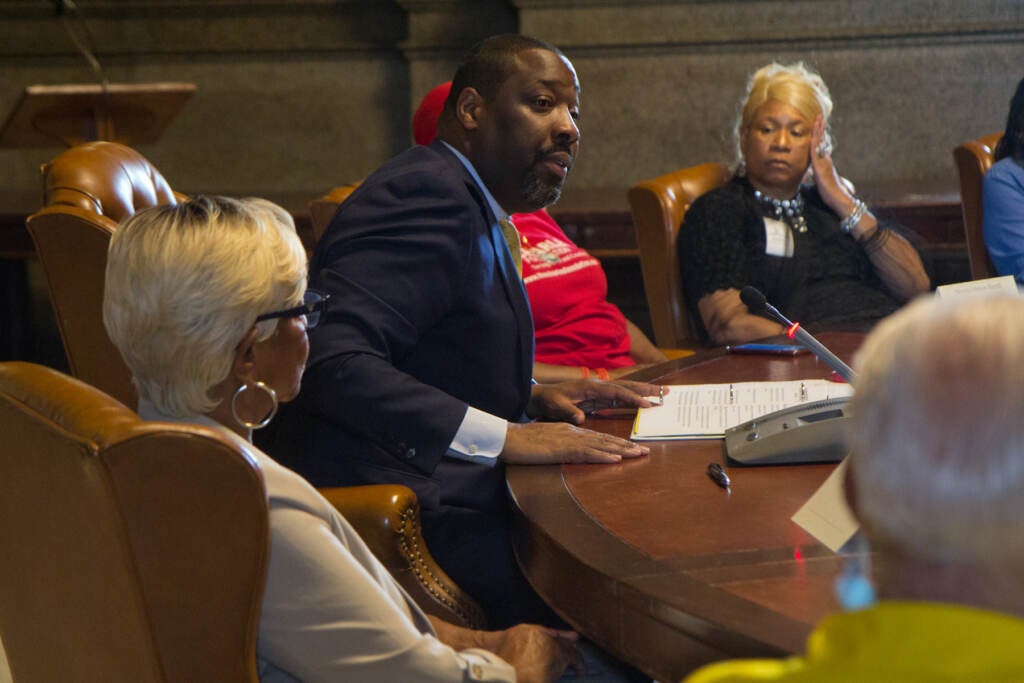
The three-hour gathering began with a series of updates from representatives in juvenile detention, probation and other agencies serving Philadelphians affected by gun violence.
Vanessa Garrett Harley, Deputy Mayor for the City of Philadelphia’s Office of Children and Families, outlined the city’s efforts to confront gun violence as a public health problem, pointing to the Anti-Violence Community Expansion Grant program, which awards funds to nonprofits promising to do prevention work.
She said city departments need to dig into the root of the crisis.
“Almost like you would if you were figuring out what causes COVID or any other chronic disease,” she said.
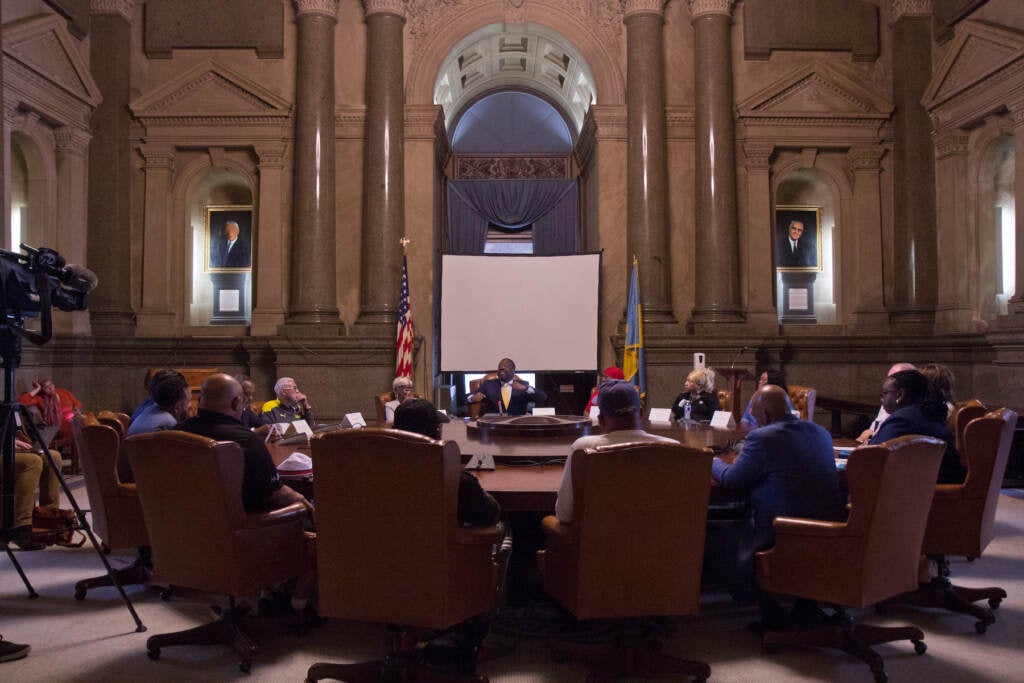
She also discussed the city’s Community Crisis Intervention Program, which places violence interrupters on the street to deter crime, and Group Violence Intervention — a law enforcement program with a “large social services footprint.”
But activists had their own requests for the city.

Yullio Robbins, whose son was murdered six years ago, said there needs to be a way to reach young people who aren’t currently connected to any social supports.
“We have so many programs going, but half of them, they’re not even working,” she said. “Once kids get used to the street, that’s what they want. They want the street, they want the fast guns, they want the fast cars.”
Other ideas included stronger community watch programs, better police relations and additional victim services.
Sister Taleah Taylor with the City of Dreams Coalition called for more transitional housing for violence-involved youth
“Because a lot of these kids that keep aging out, we find them out in the streets,” she said. “Then they’re doing whatever to survive.”
Brendan O’Malley, Chief Deputy Attorney General for the Commonwealth of Pennsylvania, discussed the origins of crime guns in the state. He noted that many ghost guns, or privately assembled and untraceable weapons, come from large-scale gun shows that do not currently require background checks.
SEPTA police chief Tom Nestel announced that the agency will be allocating funding for new outreach workers, with the goal of connecting homeless individuals and those living with mental illness to needed services.
Editor’s note: This story has been updated to accurately reflect Brendan O’Malley’s comments about firearm sales.
—
If you or someone you know has been affected by gun violence in Philadelphia, you can find grief support and resources here.
WHYY is your source for fact-based, in-depth journalism and information. As a nonprofit organization, we rely on financial support from readers like you. Please give today.



